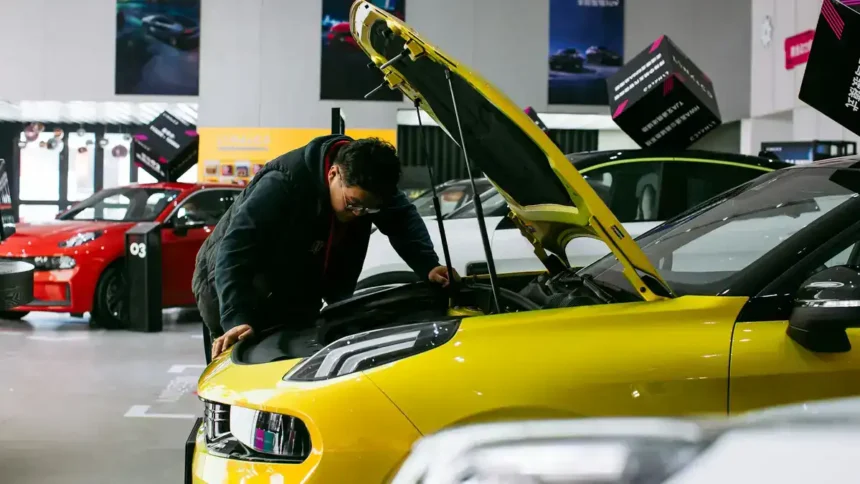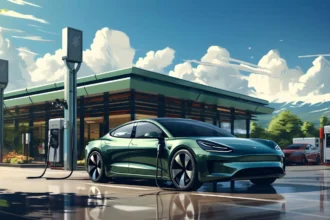Blockchain technology has emerged as a transformative force across various industries, and car manufacturing is no exception. As the automotive sector faces increasing demands for transparency, efficiency, and security, blockchain offers innovative solutions that address these challenges. By leveraging decentralized ledgers, car manufacturers can streamline their operations, enhance supply chain management, and improve overall product integrity.
This article delves into the role of blockchain in automotive manufacturing, exploring its benefits, applications, and the future it holds for the industry.
Understanding Blockchain Technology
Blockchain is a distributed ledger technology (DLT) that allows multiple parties to share and synchronize data in a secure and transparent manner. Each transaction or data entry is recorded in blocks, which are linked together to form a chain. This decentralized approach ensures that data cannot be altered without consensus from all participants, making it an ideal solution for industries requiring trust and accountability.
Importance of Blockchain in Car Manufacturing

- Supply Chain Transparency: The automotive industry relies heavily on complex supply chains involving numerous suppliers, manufacturers, and distributors. Blockchain technology can enhance visibility by providing a real-time, immutable record of each transaction. This transparency allows manufacturers to track components from their origin to the final product, ensuring quality and authenticity.
- Enhanced Security: Cybersecurity is a significant concern for car manufacturers, especially as vehicles become more connected and reliant on software. Blockchain offers robust security features, protecting sensitive data from unauthorized access and potential breaches. Each transaction is encrypted and linked to the previous one, creating a secure and tamper-proof record.
- Streamlined Processes: Blockchain can automate various processes through smart contracts—self-executing contracts with the terms directly written into code. This automation reduces the need for intermediaries, decreases paperwork, and accelerates transactions, ultimately leading to cost savings and increased efficiency.
- Improved Quality Control: By integrating blockchain into the quality assurance processes, manufacturers can ensure that every component meets safety and performance standards. If a defect is detected, blockchain allows for precise traceability, enabling quick identification of the source and facilitating recalls or corrective actions.
- Sustainability Initiatives: As consumers increasingly demand sustainable practices, blockchain can help car manufacturers demonstrate their commitment to environmental responsibility. By tracking the sourcing of materials and the carbon footprint of production, manufacturers can provide verified sustainability reports to customers.
Key Applications of Blockchain in Automotive Manufacturing
- Component Tracking: Blockchain enables manufacturers to track individual components throughout the supply chain. This capability ensures that every part used in vehicle assembly meets required standards, significantly reducing the risk of recalls and defects.
- Digital Identity for Vehicles: Each vehicle can have a unique digital identity on the blockchain, containing information such as its manufacturing history, maintenance records, and ownership changes. This transparency increases trust among buyers and sellers in the used car market.
- Autonomous Vehicle Data Management: As autonomous vehicles generate vast amounts of data, blockchain can securely store and share this information among manufacturers, developers, and regulatory bodies. This approach promotes collaboration and innovation while maintaining data privacy.
- Insurance and Warranty Tracking: Blockchain can streamline the management of insurance and warranty claims by providing a transparent and easily accessible record of vehicle history. This transparency can reduce fraud and improve customer satisfaction.
- Electric Vehicle (EV) Charging Infrastructure: With the rise of electric vehicles, blockchain can facilitate seamless transactions for charging services, ensuring fair pricing and efficient usage of charging stations. This technology can enhance user experiences and drive the adoption of EVs.
Challenges of Implementing Blockchain in Car Manufacturing
While the potential of blockchain in automotive car manufacturing is immense, several challenges must be addressed:
- Scalability: As the number of transactions increases, ensuring the blockchain can handle the load without compromising speed or efficiency is crucial. Solutions such as layer 2 scaling and sharding are being explored to overcome this issue.
- Interoperability: For blockchain to be effective, it must integrate with existing systems and technologies in the automotive industry. Developing standardized protocols will be essential for seamless communication between different platforms.
- Regulatory Compliance: The automotive sector is heavily regulated, and ensuring that blockchain solutions comply with industry standards and regulations is vital. Ongoing collaboration between manufacturers, regulators, and technology providers is necessary to navigate this landscape.
- Cost of Implementation: Integrating blockchain technology requires investment in infrastructure and training. Manufacturers must weigh these costs against the long-term benefits of adopting blockchain solutions.
Future Trends: Blockchain in Automotive Manufacturing
As blockchain technology continues to evolve, several trends are shaping its future in automotive manufacturing:
- Increased Collaboration: Collaborative platforms leveraging blockchain will allow manufacturers, suppliers, and other stakeholders to share data securely, fostering innovation and improving supply chain efficiency.
- Expansion of Electric Vehicles: As electric vehicles gain popularity, blockchain will play a crucial role in managing their unique challenges, including battery life tracking and sustainable sourcing of materials.
- Integration with IoT: The Internet of Things (IoT) and blockchain will converge, enabling smarter and more connected vehicles. This integration can enhance data security and provide real-time insights into vehicle performance.
- Regulatory Frameworks: As the adoption of blockchain increases, regulatory bodies will likely develop frameworks to guide its implementation, ensuring compliance and fostering trust among consumers and businesses.
- Consumer Engagement: Blockchain can enhance customer relationships by providing transparency and personalized experiences. Manufacturers can leverage blockchain to offer unique rewards or incentives based on customers’ vehicle usage and engagement.
FAQs about Blockchain in Car Manufacturing
Q1. What is blockchain technology?
A: Blockchain is a decentralized digital ledger that securely records transactions across multiple computers, ensuring data integrity and transparency.
Q2. How does blockchain improve supply chain transparency?
A: Blockchain provides an immutable record of each transaction, allowing manufacturers to track components from their origin to the final product, enhancing visibility and accountability.
Q3. Can blockchain help with vehicle recalls?
A: Yes, blockchain allows for precise traceability of components, making it easier to identify the source of defects and facilitate quick recalls when necessary.
Q4. What role does blockchain play in electric vehicle infrastructure?
A: Blockchain can facilitate seamless transactions for charging services, ensuring fair pricing and efficient usage of EV charging stations.
Q5. What challenges does the automotive industry face in implementing blockchain?
A: Key challenges include scalability, interoperability with existing systems, regulatory compliance, and the cost of implementation.
Q6. How can blockchain benefit consumers in the automotive sector?
A: Blockchain enhances transparency and trust in the car buying process, provides secure records of vehicle history, and allows for personalized customer experiences.
Conclusion
The integration of blockchain in car manufacturing signifies a monumental shift towards greater efficiency, transparency, and security in the automotive industry. As manufacturers increasingly recognize the potential of blockchain technology, they can streamline operations, enhance supply chain management, and build stronger relationships with consumers. While challenges remain, the future of blockchain in automotive manufacturing is promising, paving the way for a smarter, more connected automotive landscape. The ongoing evolution of this technology will undoubtedly shape the industry’s next chapter, making it an exciting space to watch as it unfolds.








